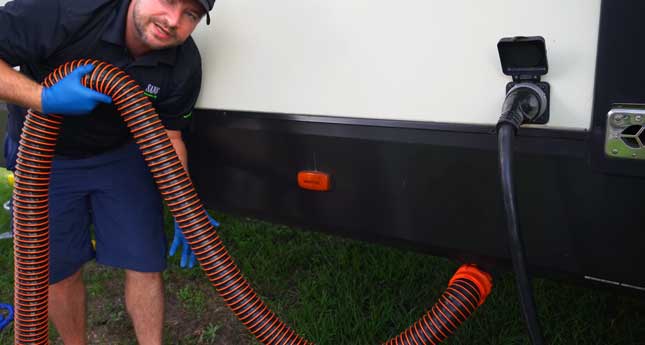Last Updated on May 22, 2023
Imagine you are traveling with your RV on the road when suddenly you notice an unpleasant smell. You finally discovered that the odors come from the bathroom area due to a clogged black water vent on the RV.
When traveling in an unfamiliar place, it can be extremely challenging to locate someone who knows how to unclog RV black water vent.
Due to blocking the vents, you may notice slow drainage and hear gurgling noises coming from drain openings. Thus, RVers should know the proper technique for unclogging a black tank vent.
When you find your RV’s black water vent is blocked, don’t panic. It’s not tricky to unclog the black tank vent in an RV using just a few tools and some common sense. Let us begin!
Why RVs Black Water Vents Clog?
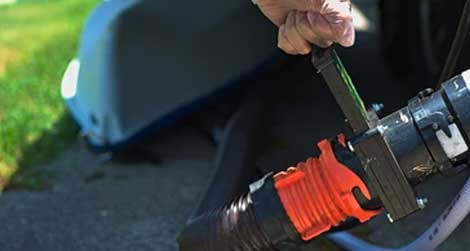
There are several reasons why an RV’s black tank vent may clog. Some common reasons are:
- Accidentally flash the RV toilet with toilet paper
- Putting too much toilet paper down the RV toilet
- Not flushing the RV toilet properly
- Foreign objects such as baby wipes, toilet paper, or sanitary napkins being flushed down the RV toilet
- Waste not being disposed of properly
- Not using the proper chemicals in the holding tank or not having it pumped out properly.
- Another possibility is that your vent stack may have separated from the holding tank. If this happens, you may have a leaking vent stack problem.
How to Unclog RV Black Water Vent Pipe – Step By Step Guide
If you are experiencing sewage odors in your RV, the black water vent is likely clogged. Here is step by step on how to unclog the pipe:
Step 01. Clear The Tank
Pump out and empty your RV black tank. While this is not mandatory, it will make the subsequent steps easier to perform.
Step 02. Locate The Black Water Vent
The black water pipe is located above the RV toilet, and it is usually covered with a square-shaped access cap. You must remove the cap before you can begin the unclogging process.
Step 03. Check The Vent Pipe
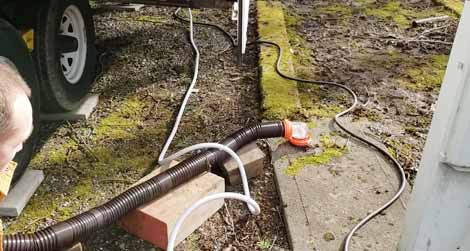
Using a flashlight, inspect that wastewater flows freely through the vent pipe. If it isn’t moving, feel inside the vent with your hand to see any blockages, such as toilet paper or paper towels, or baby wipes.
Step 04. Test Tanks Valve
Before you start unclogging the holding tank, open the RV black tank valve to see if it helps drain flow. Once the water begins draining, close the tank valve.
Step 05: Try Chemical Treatment
If the black water outlet is still clogged, put a small amount of RV toilet chemical into the bowl to help break down any blockages that might be present. After waiting for several minutes, flush the RV holding tank and see if it starts draining.
Other Methods to Unclog Black Water Vent
If the above steps do not solve the problem, it’s time to use some other methods to unclog the pipe, such as:
1. Using Power Washer or Pressure Washer
If you have a power washer or washer, put its nozzle into the black water outlet and blast away. This might be enough to dislodge any blockages and unclog your RV’s black water pipe.
Requirements:
- Power Washer or Pressure Washer,
- Safety Goggles,
- Gloves,
- Sewer Hose,
- Sewer Hose Connector,
- Tarp or Drop Cloth.
2. Using A Toilet Snake
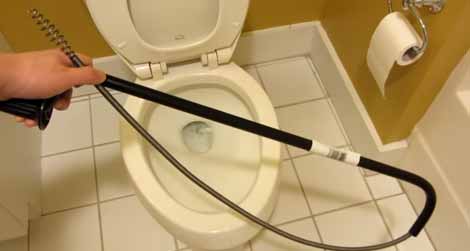
If you don’t have a power washer or washer, this method will work great to unclog RV black water pipe. Take the snake and feed it up into the black water vent until you feel resistance.
When there is resistance, slowly start to crank the snake’s handle clockwise and keep cranking until it goes inside. Do this at least four or five times and then attempt to RV black tank flush.
While flushing, if you encounter resistance, turn your hand 180 degrees and repeat this process until you can move the snake freely inside the air vent pipe.
Requirements:
- Toilet Snake,
- Gloves,
- Safety Goggles,
- Mask.
3. Utilizing Pressurized Air
If you have a can of compressed air, put the nozzle in the black water tank vent pipe and blast out. This method will also unclog your RV’s black water pipe if done enough times.
Requirements:
- Compressed Air Can,
- Safety Goggles,
- Sewer Hose,
- Hose Connector.
- Gloves.
Applying one or more of these methods should solve your problem and help you to unclog your black water vent.
What Are The Effects Of A Clogged Plumbing Vent?
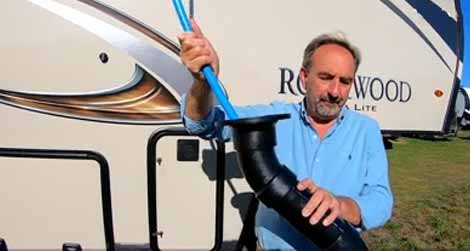
A clogged plumbing vent can cause sewage odors to be released in your RV. It can also cause sewer gas to be released into the air, becoming a health risk.
The main reason for this is that sewage gasses must first go out through your plumbing vent before going anywhere else. And if the vent is clogged, those foul odors and possible dangerous gasses will just keep building up in your RV.
In addition, a clogged plumbing vent can cause some problems with your RV’s black tank, or also known as the wastewater holding tank, which are:
Negative Pressure
A negative pressure system is a system in which the atmospheric pressure inside the RV is less than that outside.
This can happen when there is a clogged plumbing vent, and sewage gasses cannot escape from the plumbing vents in your RV. When this happens, sewage odors and sewer gas will continue to build up inside your RV.
Again, this could be dangerous for you and your family if the sewer gasses are emitted into the air. You do not want to breathe in what can be unhealthy and toxic fumes to enjoy yourself during your time in your RV.
The primary symptom, in this case, would be a sewer gas odor coming from your RV’s black water vent or bathroom sink inside of your RV. If this starts happening, then it is time to unclog your vent.
Pressure in the Wastewater Tank
If you do not unclog your RV’s plumbing vent, then the pressure could even affect areas of your blackwater holding tank. This can cause solid waste to siphon out of the black water RV holding tank and into other places where you don’t want it to be.
The major symptom of this is that you will begin to notice some drops of water, or even a stream of wastewater, coming from the camper blackwater tank drainage line and into your RV’s living area.
This can be very messy, and it would also mean that your sewer gas problems could go beyond just the inside of your RV and become an outside problem as well.
Extreme Blockages
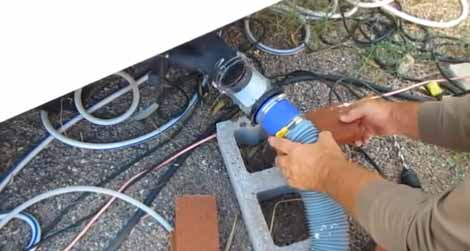
A clogged plumbing vent can also cause a clog that will become extremely difficult to remove. This will happen when sewage gases have been repeatedly emitted from your clogged blackwater tank because of a blocked ventilation system. The gray water tank can also emit odors.
This means you will have to take more extreme measures to unclog the blocked plumbing vent in your RV, such as using special tools or even consulting professionals.
You don’t want to go all the way down that road of extreme measures, though, because it means that you will need more expensive services for your plumbing vent, such as replacing it with a new one at an RV service center.
Plus, there is always the chance to make things worse if you don’t know what you are doing.
So it would be best to take care of the problem as fast as you can, and that means learning how to unclog a blocked RV plumbing vent yourself at home with simple products that are easily accessible.
Tips for Prevent Future Clogs
If you are prone to clogs in your plumbing vent, there are some things you can do to prevent them:
- Never flush wipes or anything else other than toilet paper and human waste down your RV’s black water tank.
- If you use bleach, disinfectants, or harsh chemicals around your sewage system, rinse them thoroughly, so they do not build up in the plumbing vent tubes of your RV.
- Never attempt to unclog a blocked vent yourself with chemicals. This will only make things worse and could cause a health risk inside your RV.
- Keep a vent cap on all vent openings in your sewer system at all times, unless you are using the clogged toilet or showering. You can find these vent caps at your local RV supply store.
- Do not ever skip using a vent cap when you have connected your RV sewer hose to an external sewage system connection, such as at a dump station or even your septic tank.
- Keep a sewer gas leak detector on hand for use in your RV to test any leaks in the venting system.
- Be sure to read any instructions that come with a chemical you buy or work on your RV’s venting system.
- Unclog your RV’s blocked plumbing vent with natural products before turning to harsher chemical options, which can cause hazardous fumes in your RV.
- Before unclogging a vent in your sewage system, turn off the propane tank to your water heater and furnace, mainly if they are located under your bathroom.
So remember, if you are ever beginning to notice sewer odors inside of your RV, or even water coming out of the black water drainage line in your RV, then it is time to check for a clog in the plumbing vents.
Mistakes People Make When Unclogging
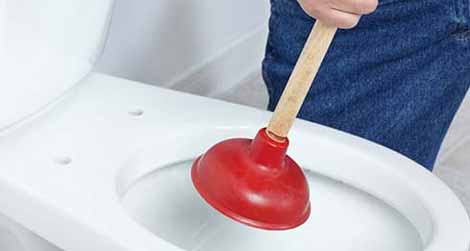
There are a few mistakes people commonly make when unclogging their RV’s plumbing vents:
1. Attempting to use harsh chemicals to clear the blockage. This can often make the problem worse and create hazardous fumes inside the RV.
2. Not reading the instructions that come with any chemicals or products to clean the vent. This can lead to using the wrong product or using it in the wrong way, which could also make the problem worse.
3. Not turning off the propane tanks to their water heater and furnace before unclogging the vents. This can lead to accidentally igniting these tanks while trying to clear the blockage, which could cause a dangerous fire.
4. Using a plunger to unclog the vent. This can lead to damaging or rupturing the vent and causing more problems down the road.
5. Blowing compressed air into the vent to remove the blockage can create hazardous fumes inside your RV when mixed with other products in your sewage system.
6. Pouring hot water down the vent to clear it. This can lead to water leaking out of the vents and causing more problems down the road.
7. Forgetting to use a vent cap when your RV sewer hose is not attached to an outside dumping system, such as at a dump station or with your septic tank in the case of RVs that cannot be connected to an outside sewage system.
8. Not checking for leaks after unclogging the vents. This can eventually lead to water leaking inside your RV, which could cause severe problems down the road if it goes unnoticed for too long.
9. Refusing to purchase a vent cover or cap because it is more expensive than other options on the market. This can lead to the waste buildup of chemicals in your sewage system, which is just as dangerous as an obstructed vent.
10. Pull out clogs with hooks or pliers when using natural products. This can rupture or puncture the vent, causing severe damage down the road if not noticed immediately and repaired right away.
11. Cleaning the vents with a caustic chemical or bleach, such as ones found in most household cleaners and dishwashing liquids. This is not only dangerous for your health, but it can also corrode the metal on the vent.
This will eventually cause more problems down the road if not properly taken care of right away.
12. Forgetting to clean out the vent before trying to unclog it. This can cause problems down the road when you are emptying your RV’s wastewater tank.
13. People usually empty their gray water tanks after emptying their black water tanks. The drain hose used in the gray water tank is also used to clean the sewer hose. This will cause odors in the gray tank.
FAQs
We will go over some of the most frequently asked questions you might have:
01. How Do I Know If My Black Tank Vent Is Clogged?
If you notice sewage odors inside of your RV’s toilet or black tank water draining out through the sewage intake, then it is likely that you have a clog in your plumbing vents.
02. What Happens If The Vent Is Clogged?
This will not only cause sewage odors inside of your RV, but it can also lead to water leaking and spilling in the tank.
Also, when a vent is clogged, it prevents air from entering the pipes, so the water remains stagnant in them.
03. Where Is The Black Water Vent Pipe On My RV?
The black water vent is usually located on the side of your RV, near one of the rear tires. In general, the RV black tank vent connects to the top of the RV vent through a hole in the roof, which is constructed from a linear piece of 1.5″ PVC.
04. How Often Should I Check The Black Water Vent?
We recommend checking your sewer line and vents at least once a week to ensure that they do not have any blockages or ruptures.
It is also recommended that you purchase a vent cap to protect your vents from debris and animals.
05. How Frequently Should You Dump Your Black Water Tank?
When RVing, it is best to dump your black water RV holding tank every 3-5 days or when it reaches one-third full.
This will prevent any sewage odors from bleeding into the inside of your RV while also preventing damage to the interior wall of the black tank.
06. How to Maintain a Healthy Black Tank Vent?
If you suspect something is wrong with your vents, such as a clog or rupture, you should try to fix it right away by using one of the methods we have described above.
07. How to Clean RV Sewer Vents?
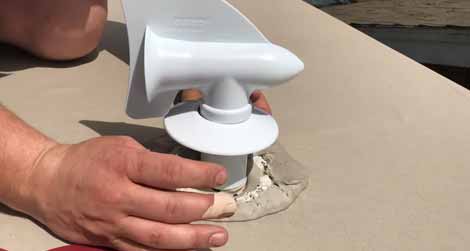
Cleaning your sewer vents frequently is one of the best ways to ensure that they do not have any blockages. We recommend turning the shutoff valve on and inserting the wand into the opening.
Rinse the waste pipe leading from the toilet bowl for several minutes after you have placed it in the beginning. In this way, waste and toilet paper buildup will be removed from the vent pipe.
08. How Do I Clean Sewer Pipes?
Cleaning your sewer lines is important because it tends to the pipelines of debris, preventing them from overflowing or clogging.
You can purchase a snake with an opening at the end that will insert into the pipe and remove all the dirt.
09. Can I Run Water With A Garden Hose Into Black Tank Vent?
No, we would not recommend that running water into your black tank vent with a garden water hose because it can cause damage to the walls of the tank and increase the likelihood of a clog.
However, if there is no other option, you may use a garden hose specifically designed to clean the black water tank.
10. Can You Pour Drain Cleaner Down Vent Pipes?
We would not recommend this method because drain cleaners can corrode the vent’s metal and cause ruptures.
11. Which Chemicals Should Not Be Used On An RV Vent?
We recommend that you not use any harsh chemicals while cleaning your vents. This is because it can corrode the metal on the vent, leading to even more problems down the road.
12. Can I Use A Plunger To Unclog The Vent?
Plungers are not designed for this purpose and will not unclog your vent. They cannot solve every clog. They are best suited for small clogs.
However, you can use a plunger to test if your vents have any blockages in them by spraying water into the opening while plunging.
Final Thoughts
So, what should you do if the vent is clogged? If sewage odors inside of your RV or black water draining out through the sewage intake, then it is likely that you have a clog in your plumbing vents. It may be the only way to gain information in this situation to refer to this article on how to unclog RV black water vent. RVers should clean the black tank vents at least once a week to prevent sewage odors and water spills. Thanks for reading!

